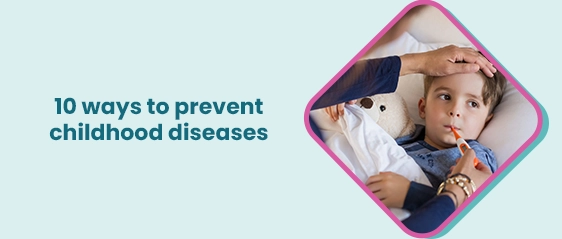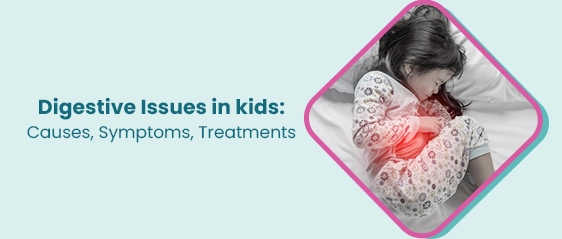
10 Essential Tips for Preventing Childhood Illnesses
- 14 Aug 2023
Childhood is a critical phase of life where the foundation for lifelong health is laid. Preventing childhood diseases is of paramount importance, as it not only ensures the well-being of children but also sets the stage for their future. In this blog, we'll delve into 10 effective ways to prevent childhood diseases and help children grow up in a healthier environment. By following these simple ideas, we can ensure that the future for our children is full of good health, energy, and happiness. All of this is made possible with the knowledge of the best children's doctors and a hospital that truly cares about kids.
Immunizations: Shielding Against Preventable Diseases
Immunizations are a cornerstone of childhood disease prevention. Vaccines provide protection against various infectious diseases such as measles, mumps, rubella, polio, and more. Following the recommended immunization schedule helps children develop immunity and safeguards them from potentially life-threatening illnesses.
Breastfeeding: Nature's Perfect Nutrition
Breastfeeding is a strong way to keep children healthy. Breast milk has important stuff like nutrients and antibodies that help a child's body fight off germs. It also helps lower the chances of getting sick with things like coughs, allergies, and tummy problems.
Healthy Diet: Nurturing Growth and Defense
Eating foods that give your body lots of good stuff is really important for kids to grow strong and stay healthy. Foods like fruits, veggies, whole grains, lean meats, and healthy fats help kids grow well and make their bodies strong against sickness.
Hygiene Practices: Keeping Germs at Bay
Teaching kids how to stay clean is super important. Washing hands a lot keeps germs away, and so does taking regular baths, cleaning teeth, and keeping everything around them nice and tidy. This helps keep them from getting sick.
Physical Activity: Building Strong Bodies and Immune Systems
Regular physical activity not only helps children develop strong muscles and bones but also enhances their immune function. Outdoor play and exercise contribute to overall health by reducing the risk of obesity, diabetes, and other chronic conditions.
Adequate Sleep: Restoring and Rejuvenating
Sufficient sleep is essential for a child's overall well-being. During sleep, the body repairs and rejuvenates itself, strengthening the immune system's ability to fend off infections. Establishing a consistent sleep routine is vital in preventing health issues related to sleep deprivation.
Limiting Screen Time: Balancing Virtual and Real Worlds
Excessive screen time has been associated with various health problems in children, including obesity and sleep disturbances. By setting limits on screen time, parents can encourage physical activity, face-to-face social interactions, and more productive leisure activities.
Safe Water and Sanitation: Foundation for Health
Access to clean and safe water, as well as proper sanitation facilities, is a fundamental requirement for preventing waterborne diseases. Ensuring that children have access to uncontaminated water and hygienic sanitation facilities significantly reduces the risk of infections.
Smoke-Free Environment: Breathing Easier
Exposure to secondhand smoke increases the risk of respiratory infections and other health issues in children. Creating a smoke-free environment at home and in public spaces helps protect children from the harmful effects of tobacco smoke.
Regular Health Check-ups: Early Detection and Prevention
Regular visits to healthcare professionals enable early detection of any health issues and ensure that children receive timely vaccinations and interventions. Monitoring growth and development through routine check-ups empowers parents to address potential concerns promptly.
Frequently Asked Questions
1.What are the 7 common childhood diseases?
The 7 most common childhood diseases are:
- Measles
- Mumps
- Rubella (German measles)
- Pertussis (whooping cough)
- Varicella (chickenpox)
- Polio
- Diphtheria
2.What are the 5 most common childhood illnesses?
The 5 most common childhood illnesses are:
- Common cold
- Ear infections
- Respiratory infections
- Gastroenteritis (stomach flu)
- Asthma
3.Why is it important to prevent childhood disease?
Preventing childhood diseases is crucial to ensure the well-being and healthy development of children. It protects them from immediate health risks and sets the foundation for a healthier adulthood.
4.How can we stop the spread of childhood infections?
The spread of childhood infections can be minimized by:
- Frequent handwashing
- Immunizations
- Proper hygiene practices
- Isolating sick children
- Avoiding close contact with infected individuals
5.What are the methods of disease control?
Disease control methods include:
- Vaccination and immunization
- Hygiene and sanitation practices
- Quarantine and isolation measures
- Health education and awareness
- Surveillance and early detection
6.How are diseases prevented and controlled?
Diseases are prevented and controlled through a combination of measures including vaccination, public health campaigns, access to clean water and sanitation, health education, early detection, and appropriate medical treatment.
7.What are 5 ways to prevent noncommunicable diseases?
To prevent noncommunicable diseases:
- Maintain a healthy diet
- Engage in regular physical activity
- Avoid tobacco and excessive alcohol consumption
- Manage stress effectively
- Get regular health check-ups
8.What are the 5 rarest childhood diseases?
Rarest childhood diseases can include conditions like:
- Hutchinson-Gilford Progeria Syndrome (aging disorder)
- Fibrodysplasia Ossificans Progressiva (ossification of soft tissues)
- Cockayne Syndrome (premature aging and growth failure)
- Niemann-Pick disease (lipid storage disorder)
- Maple Syrup Urine Disease (metabolic disorder)




